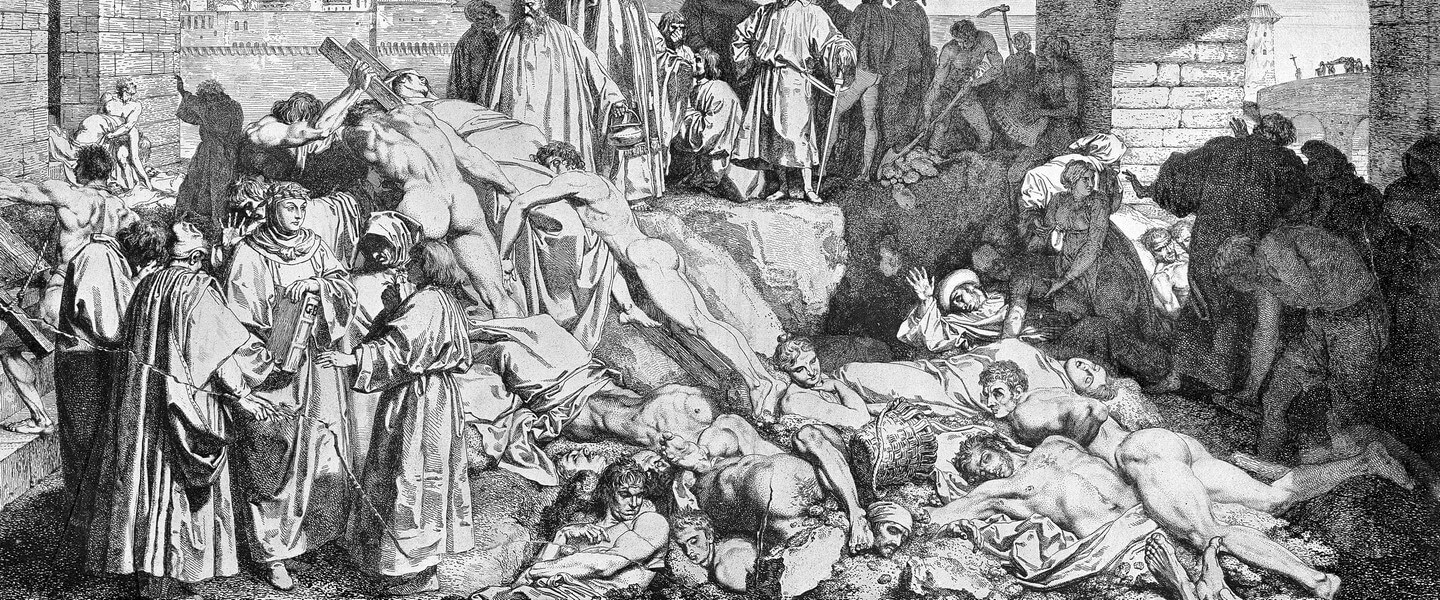“The only way to bring people together— wrote Camus—is to send them the plague.” The social consequences of a disease which indifferently impacts all layers of the population are indeed remarkable and inevitable. They are inscribed in the word that designate it, the pandemic, which speaks of a demos impacted, but also, ineluctably, transformed, if not created, by a troubling and unexpected event.
This collective threat is a social equalizer, because stratification cannot be grasped in the context of a pandemic. Like death, for Antonio de Curtis, the iconic and unforgettable character of Neapolitan theater who adopted the pseudonym Totò, the pandemic has leveled human society off: “Do you know what death is?—he asked in one of his most admirable poems—a leveler. A king, a magistrate, a great man, when they cross the gates of the cemetery know that they have lost everything, life and their name.” In biological deterioration, every human forges an identity and finds itself. In morbidity, the other does not cast light on the divergences between singularities, but rather on the analogy that binds humans together. The pandemic is thus the beginning of a new totality, a new proximity between humans.
A proximity manifesting itself in the voices rising from the balconies of every neighborhood in Naples. Unprecedented, serious, and austere Naples. Interrupted, suspended, waiting Naples. Impossible Naples, where for once music is unable to smother silence. But the shepherds of this difficult nativity scene did not choose to sing the national anthem or to applaud a public health system that has been neglected and mistreated for decades. Naples has decided to reproduce the sound of a thought flying through the air on the golden wings described by Giuseppe Verdi in Act III of Nabucco. She has also preferred to sing, through Andrea Sannino’s popular tunes, the desire to caress the neighbor without concern for a tomorrow that will probably not exist. These anthems to freedom and the present moment engulf the worried walls of the city and, at the same time, overrun them. Indeed, they do not allow themselves to be tied to territorial specificity; they retain, on the contrary, a deep transnational calling.
They want to narrate another society that could only emerge from a new bond between people. It assumes the shape of a stiff rope that, attached to a radiant window of the Vico Pallonetto in Santa Chiara, Parthenope’s historic center, supports a wicker basket. In the time of Covid-19, when the Restaurants du Coeur had to close their doors to the hunger, that did not cease to strike, this ancient contrivance served primarily to ensure food for the most destitute. Afterward, the idea was to let the basket brush the ground and to turn it into the cantor of a philanthropic message: “those who don’t have much take; those who have more give.” These words from Giuseppe Moscati, primary care doctor, starting in 1911, at the hospital for the Incurables, are the stigmata of another possible world. It signifies the possibility of building a link capable of defining our humanity. The pandemic, in this way, appears like an emerging into adulthood where the consciousness of everyone’s vulnerability is accompanied by the attention paid to the needs of others. That rope then seems to draw the boundaries of a new world, or rather, a new demos. Indeed, the Sanskrit origins of that term, dayati, retains the notion of connectedness and sharing and confers to it the meaning of equitable distribution of goods and land. This same acceptance also appears in Plato’s Banquet where the poet Agathon cuts and distributes food to his guests, Aristophanes and Socrates. Over the centuries, Naples has already shown the need for major social justice through spontaneous demonstrations by its population. The suspended coffee or pizza, are nothing more than different manifestations of that almost forgotten category of existence in a world geared toward the production and accumulation of capital: generosity.
Depositing a donation in these baskets, buying a pizza or coffee that no one will consume, means offering a gift to a neighbor one will never know. The gesture will elicit no thanks and no narration. It will not be rewarded by an expression of thankfulness or admiration; the happiness engendered by this action will bear an anonymous signature that will be the indestructible mark of its dignity. This wicker basket, whose image spread to the streets of the world, becomes the symbol of a new community, if not a new religion—if it is true that the latter carries in the weft of its name the meaning of a link between men established with a major good in mind: solidarity. It appears then, like the manifesto of a possible future, where man would no longer be a predator in the eyes of the other, he would cease to be homini lupus and would become the one who will be on the other side of the rope, without which life would be impossible, if not unbearable.
Naples, May 17, 2020, 8pm


